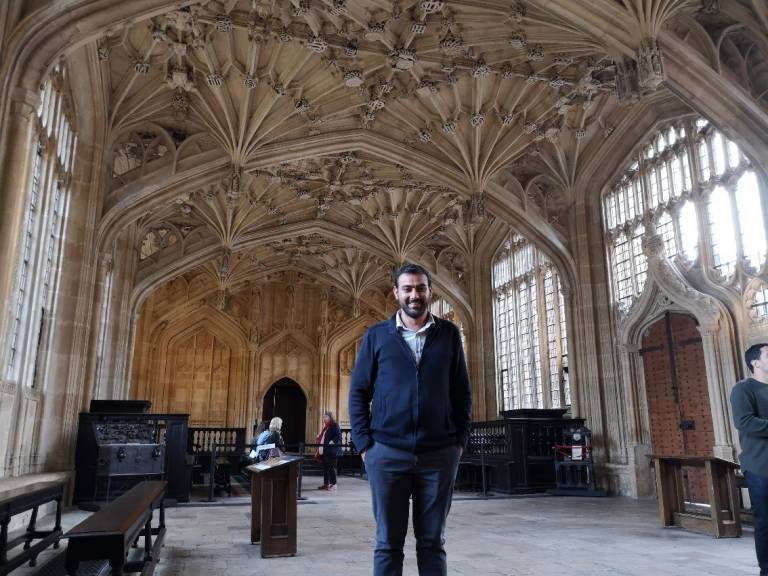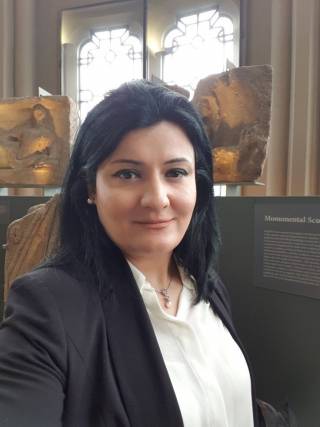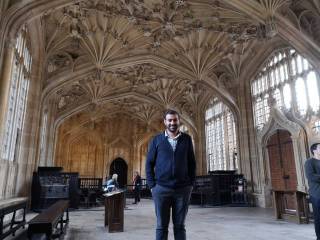The Nahrein Network Visiting Scholars from 2018
4 February 2019

The GCRF Network Plus The Nahrein Network Visiting Scholar Scheme fosters the sustainable development of antiquity, cultural heritage and the humanities in Iraq and its neighbours. It aims to support interdisciplinary research to enable universities, museums, and community groups to better serve local, post-conflict needs. The Network is based at University College London, the University of Kurdistan Hewlêr, and the Ashmolean Museum, Oxford and has many international partners. It is funded for four years, 2017-21, by the UK Arts and Humanities Research Council and the Global Challenges Research Fund Network Plus scheme.
In 2018, two rounds of the visiting scholar awards were made. Eight scholars from Iraq were awarded a scholarship for 1-2 months to attend training or undertake research at a UK host institution. The Visiting Iraqi Scholarships Scheme is run jointly by the Nahrein Network and the British Institute for the Study of Iraq (BISI).

Dr Rozhen Kamal Mohammed-Amin completed her two month visiting scholarship at the University of Glasgow.
Dr Rozhen Kamal Mohammed-Amin is the founder and head of the Digital Cultural Heritage (DCH) Research Group and lecturer at the City Planning Engineering Department at the Sulaimani Polytechnic University (SPU), Sulaimani, Kurdistan Region of Iraq. In 2018, she completed a two month visiting scholarship at the University of Glasgow.
During Rozhen’s time in Glasgow she had the opportunity to be involved in the Horizon 2020 EMOTIVE (Emotive Virtual cultural Experiences through personalized storytelling) project. “The scale and scope of multi and inter-disciplinarily research in almost every aspect of EMOTIVE project has further enriched and extended my interdisciplinary background and research” Rozhen said.
Rozhen also attended DigiFest 2018, a two-week festival celebrating the latest digital innovations in heritage organised by Historic Environment Scotland. This was recognised as being one of the highlights of the scholarship. “DigiFest was a big inspiration for the Digital Cultural Heritage Research Group that I founded at my university. I admire the work of the Historic Environment Scotland and aspire to transfer some of their wealth of experience to help the endangered cultural heritage of Kurdistan Region and the rest of Iraq”.
Going forward, Rozhen will use the new contacts, knowledge and resources from the EMOTIVE project to evaluate an EMOTIVE experience for the Slemani Museum (Archaeological museum of Sulaymaniyah and the 2nd largest museum in Iraq). “While multimedia self-guiding tours are not new to museums and historic sites in many countries, these (often) effective interpretation and storytelling mediums have never been used or researched in the context of local museums in Kurdistan Region and the rest of Iraq, where many world class collections are under-interpreted and under-researched”.

Ali al Makzomy completed his two month scholarship in the UK at the host institutions of the British Library, British Museum, Oxford's Ashmolean Museum and the University of Reading.
Ali al Makzomy is the founder of a tour group called Bil-Weekend, which aims to encourage local tourism in Iraq and engage young people in the process. During 2018, he completed a two month scholarship in the UK at the host institutions of the British Library, British Museum, Oxford's Ashmolean Museum and the University of Reading.
“As my research is about developing the infrastructure of tourism in Iraq, I spent time at The British Museum with the digital department learning how they are digitizing their collections” said Ali.
“I learnt about community engagement and how the museum functions as a place for both education and entertainment. We need to follow such procedures in Iraqi museums”.
Ali met with the Director of Iraq Scheme Programme at the British Museum and discussed the situation at Iraqi heritage sites. At the British Library he had meetings with the Director of the Endangered Archives Programme as well as engaging with the Iraq collection held at the library and discussing the future of the Mosul Library.
Ali partook in the Multaka Project at the Ashmolean Museum in Oxford. This is an initiative which provides volunteer opportunities for forced migrants. “I did not expect to have as many as benefits as did when I took part in the Multaka Project. I developed my skills and knowledge when I practiced as a tour guide in the museum. In Iraq, I work as a tour operator but I gained a lot of new and detailed information from my time in Oxford”.
Now Ali has returned to Iraq, he said that he is “already keeping in touch with the people that I met during my scholarship at the host organizations and will try to develop the ideas into projects and to implement them in cooperation with Iraq institutions and entities”. The library resources Ali accessed at the University of Reading has allowed him to further develop and deepen the tours of heritage sites in Iraq which he runs. He said that the archaeology resources about Mesopotamian sites will be used in his upcoming tours and to update his website. He will be coming back to the UK in February as he has been invited to give a presentation at a symposium in the British Museum.
In 2019, the third round of awards is open to applicants from Iraq, Iran, Lebanon and Turkey. This will be run in partnership with the British Institute for the Study of Iraq (BISI), The Iran Heritage Foundation (IHF), The Council for British Research in the Levant (CBRL) and The British Institute at Ankara (BIAA).
Ali stressed the importance of the visiting scholars programme as “it is very important for professionals to improve their skills, to have another perspectives and expand their networks”.
“I would encourage people to apply and to get this experience and I think this would help them to improve their work back home in Iraq”.
Rozhen said that the programme is “an excellent enabler for learning, networking, and widening a scholar’s perspective and experience. The opportunities gained, people met, and resources accessed were beyond those I envisioned when I filled out the application”.
Round three of the Visiting Scholars Programme will close on 15 February 2019, whilst round four will close on 15 August 2019. For more information about the Nahrein Network and the visiting scholars programme, please visit: www.ucl.ac.uk/nahrein/
Read article here
 Close
Close

